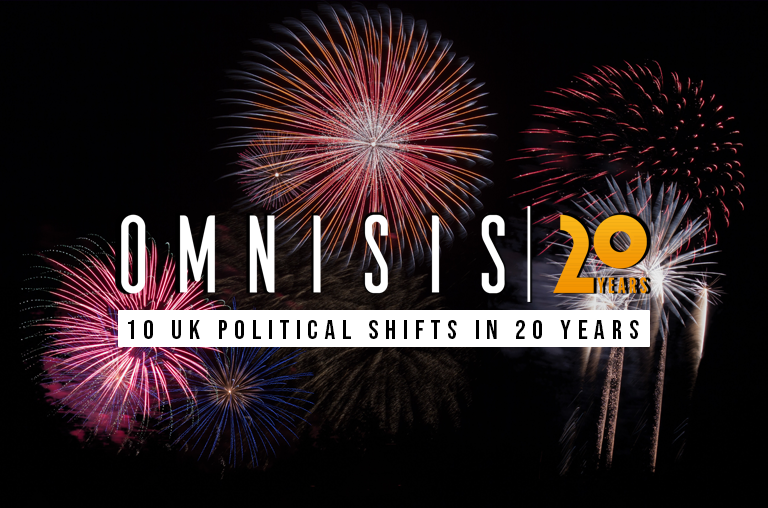The world of politics can often be a ‘blink and you’ll miss it’ business.
While our first six months of public opinion polling has given us a chance to take a regular snapshot of how political rhetoric can impact the way people think and feel, the turbulent, swirling ocean of politics waits for no-one.
Over the last two decades (and seven Prime Ministers), so much has changed. So as part of our 20th birthday celebration, we look back at ten of the biggest seismic shifts in the UK’s political landscape during that time…
2007: Leadership Change in the Labour Party:After ten years in power, Tony Blair stepped down as the Prime Minister and leader of the Labour Party to be replaced by Gordon Brown. Brown served as Prime Minister until 2010.


2009: Expenses scandal– The expenses scandal rocked Brits in 2009 when excessive and inappropriate expense claims made by MPs were revealed. They were claiming taxpayer cash for frivolous personal luxuries such as moat cleaning, duck houses, and even adult films.


2010: General Election and Conservative-Liberal Democrat Coalition –The 2010 general election resulted in a hung parliament. As a result, the Conservative Party, led by David Cameron, formed a coalition government with the Liberal Democrats, led by Nick Clegg. This marked the first coalition government in the UK since World War II.

2014: Scottish Independence Referendum –In 2014, the Scottish government held a referendum on independence. The majority of Scottish voters chose to remain part of the United Kingdom, with approximately 55% voting against independence.

2015-2019: The rise and fall of Jeremy Corbyn– In 2015, Jeremy Corbyn captured the imagination of Labour supporters with his calls for a fairer society, wealth redistribution, and an end to austerity. But his tenure as party leader was plagued by internal divisions and accusations of anti-Semitism. The 2017 general election saw an increase in Labour seats but fell short of expectations and his ambiguous stance on Brexit further contributed to the party’s electoral struggles. In 2019, the party suffered heavy losses and in early 2020, Corbyn announced his resignation as party leader.

2016: EU Referendum and Brexit –In 2016, you *may* recall, the UK held a referendum on its membership in the European Union (EU). The majority of voters chose to leave the EU, marking a significant political decision known as Brexit. This led to several years of negotiations and political developments until the UK officially left the EU on January 31, 2020.

2016 and 2019: Leadership Change in the Conservative Party– Following the Brexit referendum, David Cameron resigned as Prime Minister, and Theresa May became the leader of the Conservative Party and Prime Minister. However, due to challenges in securing parliamentary support for her Brexit deal, May stepped down as Conservative leader in 2019. Boris Johnson then won the Conservative Party leadership contest and became Prime Minister.

2019: General Election and Conservative Majority– In the 2019 general election, the Conservative Party, under Boris Johnson’s leadership, won a significant majority in the House of Commons. This allowed the government to pursue its Brexit agenda and implement other policies with greater ease.

2020: COVID-19 Pandemic – The COVID-19 pandemic had a significant impact on UK politics, leading to changes in policies, public health measures, and the government’s response. The government implemented various lockdowns, vaccine distribution efforts, and economic support programmes to mitigate the impact of the pandemic.

2022: Liz Truss, record-breaker – Remember this? After beating Rishi Sunak in the Tory leadership contest, Liz became the shortest serving Prime Minister in British history when she resigned after just 45 days at Number 10.


